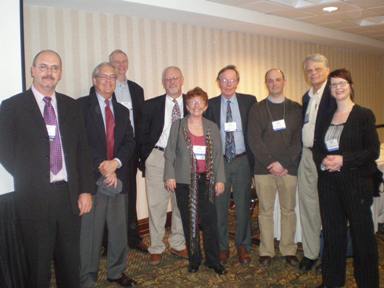Dr. Ron Lesthaeghe, Professor Emeritus, Free University of Brussels (VUB) received the 18th IUSSP Laureate during a ceremony that took place at the PAA annual meeting in New Orleans, Louisiana on 16 April 2008.

IUSSP President, John Cleland presented the award citing Ron Lesthaeghe’s influential contributions to demography, in particular his attention to the influence of cultural and economic factors on reproductive behavior. His work spans economic, historical and social demography and covers populations in Europe and sub-Saharan Africa. Several of Ron’s colleagues and former students spoke in testimony to Ron’s important influence on their research and careers and his qualities as a colleague and teacher. Ron Lesthaeghe has been a member of the IUSSP for over 33 years.
Please find below, the speech delivered by IUSSP President John Cleland during the award ceremony highlighting Ron Lesthaeghe’s contributions to the field. Ron Lesthaeghe with John Cleland
It is a great privilege for me, on behalf of the IUSSP, to honour Ron Lesthaeghe tonight because, I, like so many demographers, have been profoundly influenced by his work. I first became aware of his formidable talents in the late 1970s when he showed us all how best to analyse cross-sectional survey data on the proximate determinants of fertility, including breastfeeding. And at about the same time his important book on the decline of fertility in Belgium was published. This contained a brilliant comparison of villages lying on opposite sides of the linguistic divide which remains one of the most compelling demonstrations of the important influence of cultural factors on reproductive behaviour. The need to incorporate cultural factors as well as economic ones in explanations of fertility has been a constant theme in Ron’s research career.
Ron Lesthaeghe gained his first degree in social sciences from the University of Ghent in 1967 followed by a masters degree from Brown University in 1968. By 1970 he had been awarded a doctoral degree from Ghent with a dissertation on age structure and demographic transition. In 1971 he joined the Free University in Brussels and this was to be his base for the next 34 years. He was appointed professor and director of the Interuniversity Programme in Demography in 1977 and also served as director of the Sociology Centre from 1986 to 1988.
In 1971 and the following year Ron spent much of the time at the Office of Population Research at Princeton University and this period marks the genesis of the book on Belgian fertility. In the mid-1970s he was based in Lagos, Nigeria with the Population Council. Among many other activities he conducted a survey in Lagos, the results of which were published in a series of articles and another influential book ‘’Child Spacing in Tropical Africa’’. This volume contained the idea that an initial effect of modernisation in Africa might be to raise fertility because of the erosion of customary post-partum restraints. In 1983 he received a distinguished research award from the Population Council to analyse data from the African rounds of the World Fertility Survey. The result was a magisterial volume ‘’Social Organisation and Family Formation in sub-Saharan Africa’’ published in 1989. This represents the most profound attempt to understand variations in marriage and reproduction in the region. In the final chapter the author warns that fertility decline might plateau at 4-5 births per woman because of the continued utility of children. How prescient! Some 20 years later, fertility in sub-Saharan Africa remains at about 5 births and earlier declines appear to have faltered.
In the 1990s Ron Lestaeghe demonstrated his versatility by focussing his research on current issues in his own country. He was joint project director of a major investigation into the integration of Turkish and Moroccan migrants, the results of which were published in two books. He was also involved in Belgian-funded projects on census analysis, household projections, internal migration, differential mortality and social security. Few other demographers have the expertise and breadth of knowledge to take on such a wide range of topics.
Ron Lesthaeghe has published well over 100 books, book chapters, monographs and papers. Many are in Dutch so most of us have only a partial grasp of his output. I have already mentioned some of the key publications but let me remind you of a few others: ‘Modes of production, secularization and the pace of fertility decline in Western Europe, 1870-1930’ with Chris Wilson (1986); ‘Value changes and the dimensions of familism in the European Community’ with Dominique Meekers (1986); ‘Cultural dynamics and economic theories of fertility change’ with Johan Surkyn (1988) ‘The second demographic transition in Western Countries: an interpretation’ (1994); ‘Is low fertility only a temporary phenomenon in the European Union?’ with Paul Willems (1999); and ‘The second demographic transition in the United States: Exception or textbook example?’ with Lisa Neidert (2006). These publications have been heavily cited and greatly influential. Many must figure on reading lists for demography students. The most well known expound the concept of the second demographic transition, which has proved to be an immensely powerful model for understanding the course of fertility in the West since 1960 and which was devised by Ron in collaboration with Dirk van de Kaa.

Ron Lestaeghe’s research career has combined a mastery of technical demography and statistical methods with imaginative ideas. Chris Wilson told me many years ago that he had never encountered someone who had so many creative insights. Ron has made our discipline exciting and I can think of no higher praise than that. We are indebted to him. His many contributions to population studies have already been formally recognised. In 2003 he became only the third non-US citizen to receive the Irene Taeuber Award and in 2005 he won the Ernest-John Solvay prize from the Belgian National Science Foundation, the highest honour available for the social sciences and humanities. Congratulations now, Ron Lesthaeghe, on becoming an IUSSP Laureate.
